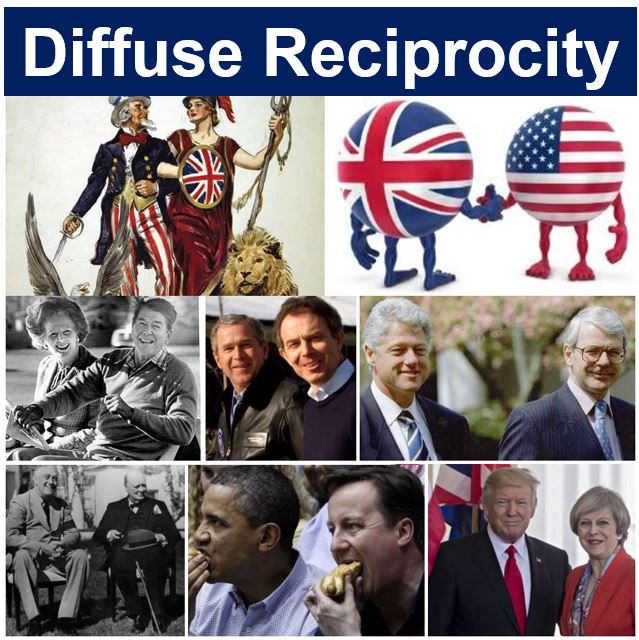Reciprocity refers to the practice of exchanging items with others for mutual benefit – ‘You scratch my back and I’ll scratch yours’. It means doing as you are done by – if you are nice or bad to me, I will be nice or bad back. The word is also used in non-business situations.
Reciprocity may occur at individual, company or country levels – one nation or organization may grant privileges to another, either in return for a favorable gesture, or to have the other party ‘owe them one’.
According to BusinessDictionary.com, to define reciprocity is:
“1. General: Exchange of equal or identical advantages or privileges, such as removal of traveling restriction between two countries.”
“2. International trade: Lowering of import duties and other trade barriers in return for similar concessions from another country. Reciprocity is a traditional principle of GATT/WTO, but is practicable only between developed nations due to their roughly matching economies.”

Reciprocity – international relations
In treatise and international relations, the principle of reciprocity states that benefits, favors or penalties that are granted by one country to the people or legal entities of another nation, should be returned in kind.
Examples of reciprocity include the granting of copyrights to foreign authors and musicians, the reduction in tariffs (taxes on imported goods), the relaxations of visa requirements and travel restrictions, the mutual recognition of judgments and their enforcement, and extradition agreements.
Diffuse Reciprocity
Diffuse reciprocal refers to a wider institutionalization of trust. Through years of cooperation in an international society, countries are seen as creating standards of behavior that have become generally accepted.
These accepted standards exert normative pressures of their own on state action, which contribute to the development of long-term obligations between countries which stress cooperation.
In a system of diffuse reciprocity, countries do not need to seek the immediate benefits expected by specific reciprocity. However, they are confident that their cooperative actions, in the long run, will be repaid.

Robert Owen Keohane, an American academic, who after his book – After Hegemony – was published, became widely associated with the theory of neoliberal institutionalism in international relations, wrote regarding diffuse reciprocity:
“The definition of equivalence is less precise, one’s partners may be viewed as a group rather than as particular actors, and the sequence of events is less narrowly bounded. ”
“[Actors participate and share] not because of ensuing rewards from specific actors, but in the interests of continuing satisfactory overall results for the group of which one is a part, as a whole.”
However, when it really matters, the parties in that group expect the other(s) to step up. For example, when Argentina invaded the Falkland Islands, US President Ronald Reagan sided with the United Kingdom; and when President George Bush asked for military help to invade Iraq, British Prime Minister Tony Blair stepped up.
Reciprocity – social and political philosophy
In society, reciprocity is a notion we have that others will treat us as we treat them – we all respond to one another in similar ways.
When one person receives a gift or an act of kindness, he or she will respond with some kind of equivalent benevolence.
The same applies with hurtful or harmful acts – if somebody is deliberately harmed by another person, he or she should either expect retaliation or indifference.
The rules governing reciprocity in society can either be crude and black-and-white – as in the eye-for-an-eye approach – or sophisticated and complex – as in somebody donating anonymously to an international organization for receipt of the love of a parent or some other very personal benefits.

– 1-to-1 Reciprocity: these are direct, 1-to-1 arrangements between governments, institutions or individual people. They might be one-off arrangements, or long-term embedded relationships.
Parents may have expectations that their offspring will reciprocate for being cared for when they were babies by looking after their parents when they are elderly.
Governments make treaties with each other, and companies have long-term contractual obligations with other commercial enterprises.
Some reciprocal 1-to-1 relationships may be more indirect. There are sometimes long chains of exchanges, where the first person gives to the second, who then passes on a similar benefit to a third, and so on – each individual in the chain expects ‘what goes around will come back around eventually’.
– 1-to-Many or Many-to-1: these forms generally lie somewhere between generalized reciprocity and direct reciprocal arrangements. Informal clubs are examples of 1-to-many reciprocity. Birthday parties, baby and bridal showers are examples of the many-to-1 type.
– Generalized Reciprocity: the donors do not typically know each other; they work within an extensive network of social transactions. The donors have no expectations about getting anything in return – other than, maybe the kind of social insurance one gets by keeping the network itself going.
Recipients often have no idea who the donors are, and thus cannot return in-kind to the network. However, they often feel obligated to pay back in some way to the network.
Examples of generalized reciprocity include food banks and blood banks. If I receive a blood transfusion in hospital, I am unlikely who know who donated that blood – but I will feel grateful and probably obligated too.
In fact, any type of stable social structure where a division of labor exists will have a system of reciprocal exchanges of this generalized type, as a way of maintaining social norms.
Reciprocity in other languages: la réciprocité (French), reciprocidad (Spanish), Gegenseitigkeit (German), reciprocità (Italian), reciprocidade (Portuguese), взаимность (Russian), 相互主義 (Japanese), 互惠 (Chinese), تبادل (Arabic), पारस्परिक (Hindi), pembalasan (Indonesian), timbal balik (Malay), ความสัมพันธ์ซึ่งกันและกัน (Thai), wederkerigheid (Dutch), ömsesidighet (Swedish), gensidighed (Danish), gjensidighet (Norwegian), wzajemność, and usawa (Swahili).
Video – Persuasion by reciprocation – Definition and Meaning
In this video, Brian Tracy talks about reciprocity and how it influences people when we are trying to persuade them – a vital skill for any sales person or negotiator.
